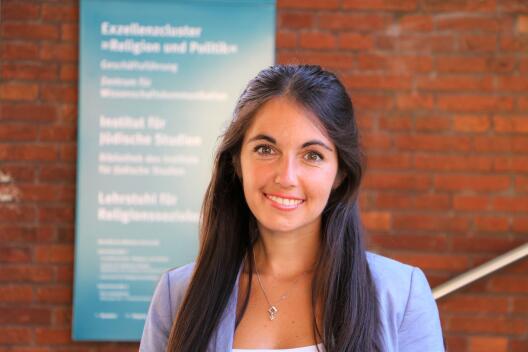Corona survey: people ready to show solidarity and togetherness
“Despite Corona and restrictions on contact, people are sticking together more” – according to survey, pandemic is strengthening religiosity of believers – faith of people who do not belong to any religious community is tending to weaken – first episode of the “Religion and Politics” podcast
Press release 11 March 2021
Despite the Corona pandemic and restrictions on contact, people in Germany are continuing to show solidarity and togetherness, according to a survey by the University of Münster’s Cluster of Excellence “Religion and Politics”. In the non-representative online survey from July 2020 to January 2021, 63% of the good 2,300 respondents say that they show more solidarity and helpfulness in their everyday lives during the pandemic. Also, 45% feel more (and only 17% less) connected to their fellow human beings despite the restrictions on physical contact, as political scientist Carolin Hillenbrand from the Cluster of Excellence explains in the new Cluster podcast “Religion and Politics” (in German). The survey also reveals that social trust in fellow human beings did not decline during the Corona period among most respondents, but rather remained the same. At the same time, trust in public institutions increased for 42% of the respondents. Hillenbrand: “Despite the Corona pandemic and restrictions on contact, people are sticking together more”.

Religiosity plays an important role in this, as Hillenbrand explains in the podcast on the Cluster of Excellence’s annual theme, “Belonging and Demarcation”. “We can see significant correlations between religion and dimensions of social cohesion such as trust, a sense of belonging, and (a willingness to take) responsibility as well as engagement”, she says, adding that the role of religion is ambivalent. According to the survey, people who attend religious services more often trust their fellow human beings, show more solidarity in everyday life, and are more socially committed. The situation is different for people with an exclusivist, delimiting understanding of their faith. “Those who deem their own religion to be the only acceptable one trust their fellow human beings and public institutions less in the Corona period. This group also shows less solidarity, complies less with laws, and is less politically engaged”. Another obstacle to cohesion is a person’s belief that her own religion is right even if it is contradicted by science. “This goes hand in hand with a lower level of trust in institutions, a weaker sense of social and national belonging, and a lower adherence to rules”.
Corona and conspiracy theories
The survey also explored the correlation between religiosity and conspiracy theories, asking respondents to give their opinion on different interpretations of the pandemic, such as the statement, “There are evil, hidden forces behind the Corona pandemic are ”. Almost 10% agreed with this statement. “This group mainly comprises people with a formally lower level of education. Age and gender do not play a significant role, but people’s political orientation”, says Hillenbrand. “People who classified themselves further to the political right have a stronger suspicion that there are evil forces hidden behind the corona pandemic”. The group also increasingly includes believers whose image of God is marked by punishment, guilt and fear, and who interpret the Corona pandemic as God’s punishment. “On the other hand, religious practice such as attending religious service and involvement in a religious community goes hand in hand with a weaker conspiracy mindset”.
Corona and religion
The online survey also shows how the pandemic is affecting people’s faith: 57% of respondents say that their faith has remained unchanged during Corona; a third, that it has become stronger; just under 11%, weaker. More than half say that their faith has given them comfort, hope and strength during the Corona period, this group comprising especially those who describe themselves as religious, pray more, and participate in religious services. Thus, the Corona pandemic is particularly increasing the religiosity of believers. The faith of people who do not belong to any religious community, on the other hand, is tending to weaken. “A deep, personal relationship with God thus seems to sustain and give support in times of crisis like the Corona pandemic”, says Hillenbrand. “This touches on a central religious issue: namely, the question of how people deal with contingency, insecurity, and uncertain situations. As the sociology of religion would argue, religion is fulfilling its genuine task of dealing with contingency in the Corona period”.
Hillenbrand is collecting the data as part of her research at the Cluster of Excellence’s Graduate School. The study arose in cooperation with an international research group led by the Antonianum University in Rome. Also involved from Germany is the “Research Institute for Social Cohesion” (FGZ) at the University of Leipzig. The research group is investigating the influence of the COVID19 pandemic on people’s social, political and religious attitudes and behaviour in several countries. Hillenbrand will explain the results and how she evaluated them in the first episode of the Cluster of Excellence’s podcast “Religion and Politics”. (mit/sca/vvm)

